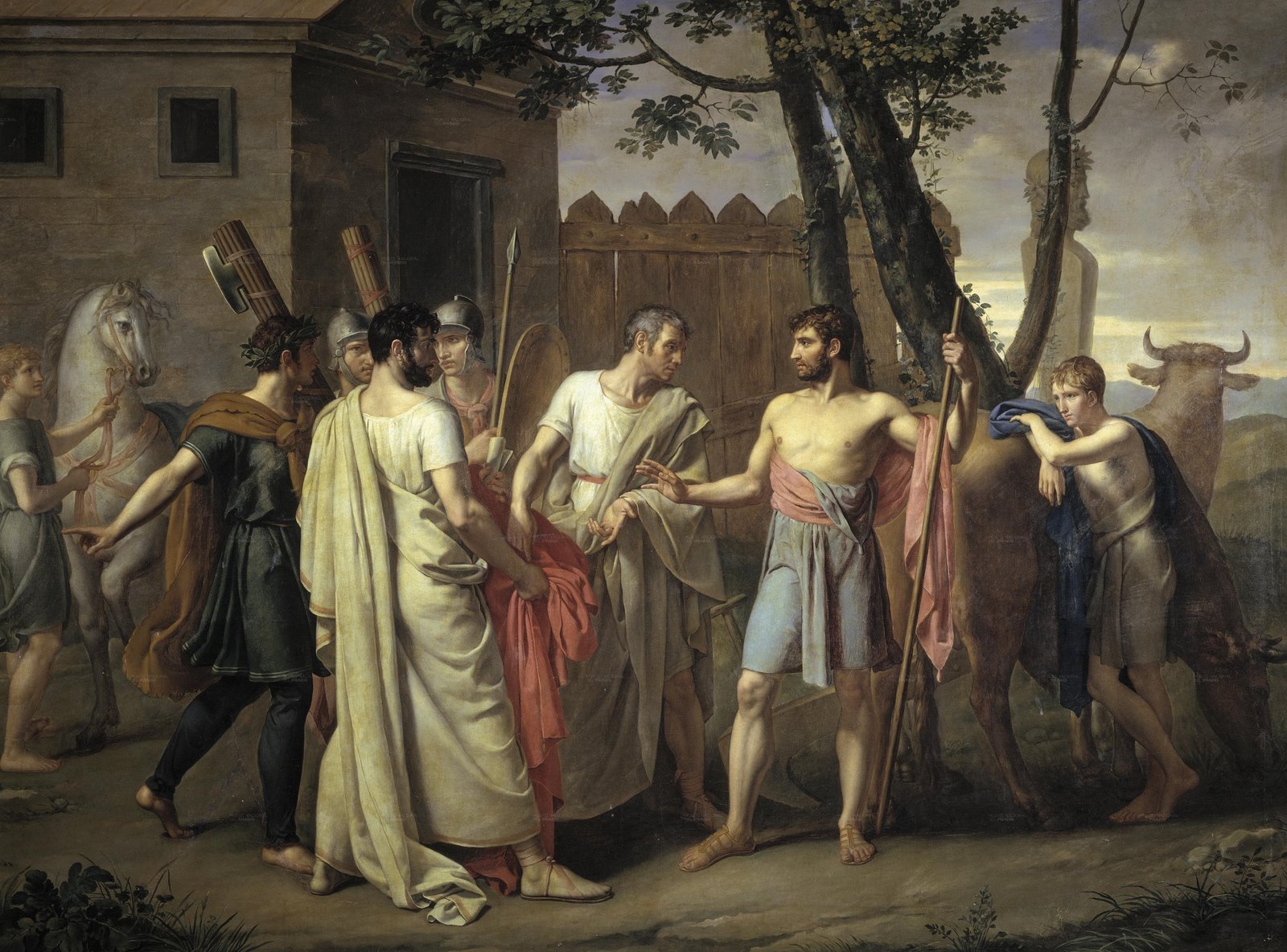Cincinnatus appointed dictator
What was happening in Greece at this time?
The First Peloponnesian War was in full swing, with Sparta leading the Peloponnesian League on one side, with Athens and her allies (the Delian League) on the other. The democratizing trend in Athenian politics continued under Pericles; the office of Archon was given a salary and lower class Athenians were given the right to hold it. Also, construction of the long walls began; these would link Athens to the port of Piraeus. Thus Athens was able to prosecute a war even if she lost control of her hinterlands by relying upon her fleet for the necessities of life.
Definitions
To help understand the Cincinnatus story better, it helps to know that his appointment as dictator occurred against a background of social conflict in the Roman state. The two opposing groups were the Patricians and Plebeians. The Plebeians wanted an expansion of their political rights and the Patricians opposed this expansion. The consuls sided with the Patricians while the Tribunes represented the interests of the Plebeians. The two groups are described below.
Patricians:
derived from the Latin patricius which means patrician. Patricius is related to pater, meaning father. Each of these men, known as the paterfamilias (head of household or family), collectively advised the king of Rome. They led a small group of clans that held a privileged position in society and in government. They were often addressed as “fathers”. They were also members of the senate and during the early republic (509-to-367 BC) were the only ones entitled to hold higher political office or the priesthood. No one is sure how these families became patrician. We know that some, like the Claudii, migrated to Rome from other cities where they were prominent. You could not become Patrician. You had to be born Patrician. And you didn’t necessarily have to be wealthy to be considered a Patrician, although most Patrician families were well off.
Plebeians:
all of those Roman freeborn men who were not Patricians were considered Plebeians. This also applied to their families as well. There is speculation as to the origin of the Plebeian order; scholars have argued that they were either native born commoners, clients of Patricians or, originally, metics (that is, foreigners providing various services as they did in Athens but with no citizenship rights).
Context for the Cincinnatus Story
Roman foreign and domestic affairs were bound up with the conflict between the orders (Patrician versus Plebeian). To simplify; the Plebeians were seeking greater political rights while the Patricians resisted these efforts. Plebeian rights were championed by the Tribunes while Patrician interests (a restricted franchise with the magistracies open to only Patricians) were represented by the Senate and by the magistrates (especially the consuls). By this time there had already been one secession, a strike, by the Plebeians. This conflict could extend even to the Roman army where the infantry, largely Plebeian, would refuse to fight (a work slowdown?) at key moments on campaign.
The conflict between the orders was a serious weakness in the Roman state. And Rome’s enemies knew it. Thus when Rome was being roiled by internal social and political conflict, the Volsci and Aequi took advantage by raiding Latin and Roman territory.
Cincinnatus appointed dictator
Cincinnatus had moved to a small farm across the Tiber from Rome because he had lost his wealth when he offered it as surety for his son—Caeso, who was accused of murder—to appear for trial before a magistrate. His son, fearing the outcome of a trial, went into exile, causing Cincinnatus to forfeit his wealth. It was while he was working his farm that representatives of the consul Horatius Pulvius approached Cincinnatus to become dictator after Roman arms had been vanquished by the Aequi and Volscians.
Moral of the Cincinnatus Story
Cincinnatus abandons his farm in order to become dictator of Rome.
The painting is by Juan Antonio Ribera, 1806, executed in the neoclassical style of David. Downloaded from Wikipedia. This image is in the public domain because its copyright has expired. This applies to the United States, Australia, the European Union and those countries with a copyright term of life of the author plus 70 years.
Livy portrays Cincinnatus as a humble patriotic servant of the state, who undertook the office of dictator and then voluntarily gave it up as soon as the reason for his appointment was removed. This was seen as selfless loyalty to the republic and adherence to the rule of law.
Cincinnatus was, in fact, a Patrician who opposed giving the commons (Plebeians) of Rome any additional political rights. He was an unyielding conservative.
Cincinnatus accepted the office of dictator and the next day summoned all of the men of military age to arms. He marched them off against the enemy which they utterly defeated at the battle of Mons Algidus. He resigned his office 15 days later and returned to his farm.

